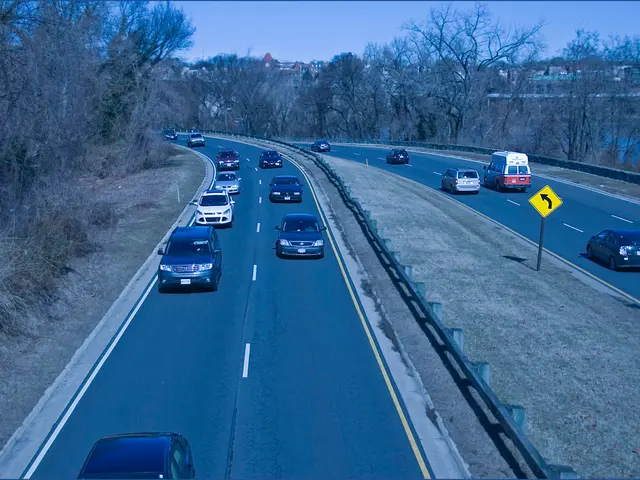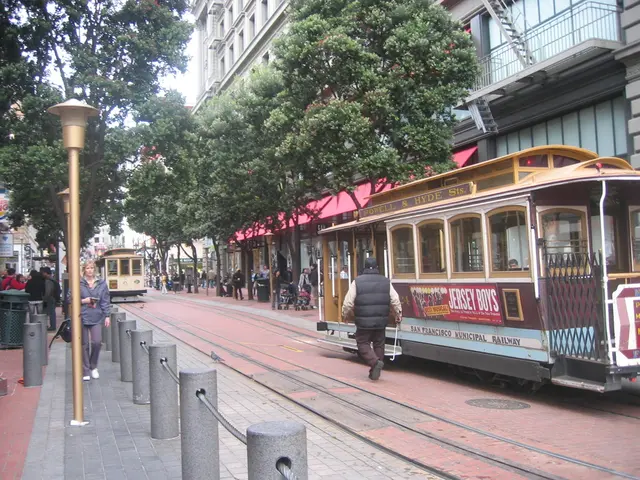Train service disrupted on Line RE1 for extended period due to ongoing infrastructure development projects - Line RE1 trains out of service due to extensive construction work for multiple weeks
Disrupted Train Services on RE1 Line Due to Construction Work in June and July
Passengers on the RE1 train line, linking Magdeburg, Berlin, Potsdam, and Brandenburg an der Havel, should anticipate significant disruptions in June and July 2025. The section between Brandenburg and Potsdam will be out of service for several weeks due to construction work, with buses serving as a temporary solution.
The heavily utilized RE1 line runs from Magdeburg via Potsdam and Berlin to Frankfurt (Oder) and Cottbus. In June, from the 6th to the 23rd, all trains on the RE1 line between Brandenburg Hauptbahnhof and Potsdam Hauptbahnhof will be suspended. Moreover, occasional disruptions will affect the section from Berlin-Friedrichstraße to Brandenburg/Havel.
Following this interruption, from June 23 to July 4, the connection between Groß Kreutz and Brandenburg Hauptbahnhof will be closed. During this period, only one train per hour in each direction will operate on the Potsdam-Groß Kreutz section. Furthermore, the RE8 line has also announced disruptions.
These full closures are facilitated by track renovations, signaling, and safety technology upgrades. Passengers are urged to plan extra travel time and verify updates before embarking on their journey.
While specific updates on the RE1 line's schedule changes during this period have not been provided, ongoing construction and maintenance work often lead to amendments in train services, including interval changes, cancellations of stops, platform changes, and the utilization of replacement buses. u201CMany construction projects, such as signal repairs, platform renovations, and track work, are planned or ongoing, affecting train schedules from spring 2025 through mid-year,u201D according to available information.
For travel between Potsdam and Berlin, passengers may encounter timetable changes and platform shifts. To bypass potential inconveniences, alternative routes or connections may be advised. In situations where services are suspended for construction, rail replacement buses and alternative S-Bahn commuter services are typically provided.
Travelers are encouraged to consult official timetable and disruption information before beginning their journey. Up-to-date schedules and notices are available on the DB Regio Nordost website, S-Bahn Berlin site, and the VBB app "Bus&Bahn." For commuters frequently using affected routes, subscribing to the DB Regio Bau-Newsletter for construction and disruption alerts may be useful.
It is recommended to use rail replacement buses during train service suspensions, and to allow for additional travel time, especially when verifying platform changes at stations like Berlin Hauptbahnhof or Potsdam Hauptbahnhof.
In summary, while no specific RE1-related disruptions have been mentioned, widespread construction activities affecting regional rail in the Berlin-Brandenburg-Magdeburg corridor are ongoing throughout June and July 2025. Travelers should rely on real-time journey planners and official announcements for the most current information on the RE1 line and alternative routes.
[1]["RE1 line disruptions and construction updates, 2025," DB Regio Nordost website, accessed May 2025][2]["BER line disruptions and construction updates, 2025," S-Bahn Berlin website, accessed May 2025][3]["Brandenburg an der Havel to Potsdam and Magdeburg railway construction projects on-going since spring 2025," railway-technology.com, accessed May 2025][4]["Timetable changes and disruptions for S-Bahn and DB Regio lines in Berlin and Brandenburg," Deutsche Bahn website, accessed May 2025]
The community is urged to brace for potential changes in the RE1 line's schedule from June to July 2025 due to construction work, as this period will witness track renovations, signaling, and safety technology upgrades. To alleviate the impact of these disruptions on vocational training programs, students might consider seeking alternative finance solutions to cover transportation costs during public-transit fluctuations, especially when relying on rail replacement buses. This vocational training might involve industry-relevant skills, with vocational training centers potentially offering flexible schedules to accommodate transport alterations.








